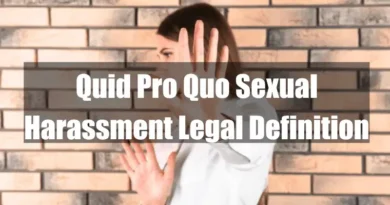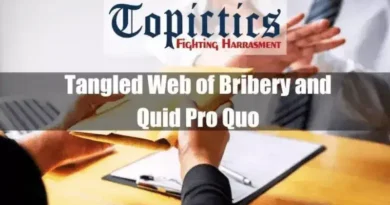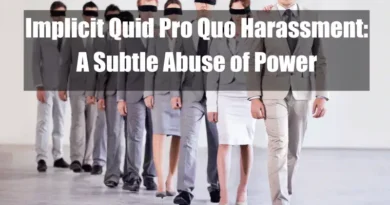Quid Pro Quo Corruption Meaning
Quid pro quo corruption refers to situations where a public official provides a benefit in exchange for something of value, such as money or favors, from another party. This mutual exchange implies that the official’s actions are influenced by personal gain rather than public interest. Such arrangements can undermine public trust in government and may violate laws designed to prevent bribery and ensure ethical conduct in public office.
Takeaways
| Key Points |
|---|
| Quid pro quo corruption occurs when a public official uses their position to provide a benefit in exchange for personal gain, such as money or favors, compromising the integrity of their office. |
| Quid pro quo, a legal concept referring to the exchange of something valuable for an official act, is lawful in certain contexts but becomes illegal when it involves misuse of public office for personal gain, constituting bribery or corruption. |
| Legal quid pro quo includes contractual agreements and lobbying activities without explicit promises, while illegal forms encompass bribery (offering value to influence actions), extortion (coercing value through threats), kickbacks (returning funds for favorable treatment), and illegal gratuities (giving value for past official acts). |
| Relevant laws, such as the U.S. Foreign Corrupt Practices Act (FCPA) and Honest Services Fraud Statute, as well as international frameworks like the United Nations Convention against Corruption (UNCAC), aim to criminalize and prevent these corrupt practices. |
| The key elements of quid pro quo corruption include the ‘quid’ (thing of value), the ‘quo’ (official act), and the intent of both parties to engage in a corrupt exchange, distinguishing it from lawful reciprocity. |
Definition of Quid Pro Quo Corruption
Quid pro quo corruption is when a public official agrees to perform an official act in exchange for personal benefit, such as money, gifts, or services. This form of corruption undermines the integrity of public office, as decisions are influenced by private gain rather than the public good. The term “quid pro quo” is Latin for “something for something,” highlighting the reciprocal nature of the exchange.
Historical Background
Origin and Evolution of the Term Considering Corruption
The phrase “quid pro quo” has its roots in 16th-century Latin, initially used in the context of apothecaries who substituted one medicine for another. Over time, its application broadened to describe any reciprocal exchange. In politics and law, it evolved to specifically denote situations where official actions are exchanged for personal benefits, thereby constituting corrupt practices.
Notable Historical Cases
- Teapot Dome Scandal (1920s): U.S. Interior Secretary Albert Fall secretly leased naval oil reserves to private companies in exchange for bribes, leading to his conviction.
- Watergate Scandal (1970s): Members of President Nixon’s administration were implicated in attempts to cover up a break-in at the Democratic National Committee headquarters, involving abuses of power and quid pro quo arrangements.
- Impeachment of President Donald Trump (2019): Allegations arose that President Trump sought assistance from Ukraine to investigate political rival Joe Biden in exchange for military aid, leading to his impeachment by the House of Representatives.
Legal Definition and Framework
Explanation of Quid Pro Quo in Legal Terms
Legally, quid pro quo refers to an arrangement where something of value is exchanged for an official act. While reciprocal exchanges are common in business and politics, they cross into illegality when they involve misuse of public office for private gain, constituting bribery or corruption.
Distinction Between Legal and Illegal Quid Pro Quo
- Legal Quid Pro Quo:
- Contractual Agreements: Mutual exchanges in business contracts where services or goods are lawfully traded.
- Lobbying Activities: Providing information or support to legislators without explicit promises of favorable official actions.
- Illegal Quid Pro Quo:
- Bribery: Offering or receiving something of value to influence an official’s actions.
- Extortion: Demanding something of value in exchange for official acts.
- Kickbacks: Returning a portion of received funds as a bribe for favorable treatment.
Relevant Laws and Statutes
- United States:
- Foreign Corrupt Practices Act (FCPA): Prohibits U.S. entities from bribing foreign officials to obtain or retain business.
- Honest Services Fraud Statute: Criminalizes schemes to defraud citizens of honest services through bribery or kickbacks.
- International:
- United Nations Convention against Corruption (UNCAC): A global treaty aimed at preventing and criminalizing corruption.
- OECD Anti-Bribery Convention: Requires signatory countries to criminalize bribery of foreign public officials.
Understanding these distinctions and legal frameworks is crucial for identifying and combating quid pro quo corruption in various sectors.
Elements of Quid Pro Quo Corruption
Quid pro quo corruption involves a reciprocal exchange where a public official’s actions are influenced by personal gain rather than public interest. This form of corruption undermines the integrity of public office and erodes public trust in government institutions. The key elements of quid pro quo corruption include:
The ‘Quid’: Thing of Value Offered
The term “quid” refers to the benefit provided to the public official, which can take various forms, such as money, gifts, services, or favors. This ‘quid’ serves as the incentive for the official to act in a manner favorable to the provider. The “thing of value” can include a campaign contribution, so long as that was received in exchange for official acts.
The ‘Quo’: Official Act or Favor in Return
In exchange for the ‘quid,’ the public official performs a specific action or provides a favor that benefits the giver. This ‘quo’ can include policy decisions, awarding contracts, or other official acts that the official has the authority to execute. The Federal crimes of bribery require proof of an exchange of a thing of value for an official act, given with a corrupt state of mind.
Intent and Agreement Between Parties
A crucial component of quid pro quo corruption is the mutual understanding and intent between the parties involved. Both the giver and the recipient must knowingly engage in the exchange with the intent to influence official actions for personal gain. Bribery requires proof of a quid pro quo—a specific, corrupt intent to give or receive something of value in exchange for an official act.
Forms of Quid Pro Quo Corruption

Quid pro quo corruption manifests in various forms, each involving the exchange of something valuable for an official act. The primary forms include:
Bribery
Bribery involves offering, giving, receiving, or soliciting something of value to influence the actions of an official. This form of corruption requires a clear quid pro quo arrangement, where the benefit is provided in direct exchange for a specific official act. Bribery requires proof of a quid pro quo—a specific, corrupt intent to give or receive something of value in exchange for an official act.
Extortion
Extortion occurs when an official demands or receives something of value by threatening harm to the provider, whether physical, reputational, or economic. In this scenario, the giver may feel compelled to comply due to fear of the threatened consequences. Extortion has three basic elements: 1) a public official (or someone pretending to be a public official), 2) extracts a thing of value from another person, and 3) by the use of threats, placing the person in fear of injury or kidnapping the person.
Illegal Gratuities
Illegal gratuities involve giving or receiving something of value for or because of an official act without the explicit agreement of a quid pro quo. Unlike bribery, illegal gratuities do not require proof of intent to influence future actions, but they are still prohibited because they can lead to a loss of impartiality in official duties. In essence, a bribe requires a quid pro quo; a gratuity does not.
Kickbacks
Kickbacks are a form of corruption where a portion of the benefit received from a contract or transaction is returned to the person who facilitated the deal. This often occurs in procurement processes, where officials award contracts in exchange for a share of the profits. Kickback: A form of negotiated bribery in which a commission is paid to the bribe-taker in exchange for services rendered.
Distinguishing Quid Pro Quo Corruption from Other Practices
It’s essential to differentiate quid pro quo corruption from legitimate practices to maintain ethical standards without hindering lawful interactions.
Lobbying vs. Bribery
Lobbying involves advocating for specific legislation or policies by providing information and arguments to public officials. While lobbying is legal and regulated, it becomes bribery when something of value is offered or exchanged to influence an official act. Bribery requires proof of a quid pro quo—a specific, corrupt intent to give or receive something of value in exchange for an official act.
Legal Reciprocity vs. Corrupt Exchanges
Not all exchanges of value constitute corruption. Legal reciprocity involves lawful and ethical exchanges, such as contractual agreements where both parties benefit without violating laws or ethical standards. In contrast, corrupt exchanges involve the misuse of public office for private gain, undermining public trust and the integrity of institutions.
Understanding these elements and forms of quid pro quo corruption is essential for identifying and preventing unethical practices in public and private sectors.
Legal Consequences and Penalties
Engaging in quid pro quo corruption carries significant legal ramifications, encompassing criminal charges, civil penalties, and detrimental impacts on public office and professional careers.

Criminal Charges and Sentences
Under U.S. federal law, bribery of public officials is a grave offense. A conviction under 18 U.S.C. § 201(b) can lead to imprisonment for up to 15 years, fines up to $250,000 or triple the value of the bribe (whichever is greater), and disqualification from holding any office of honor, trust, or profit under the United States.
Similarly, extortion under color of official right, as defined in the Hobbs Act (18 U.S.C. § 1951), is punishable by up to 20 years in prison. These stringent penalties underscore the severity with which the legal system treats such corrupt practices.
Civil Penalties
Beyond criminal sanctions, individuals and entities involved in quid pro quo corruption may face substantial civil penalties. For instance, violations of the Foreign Corrupt Practices Act (FCPA) can result in civil fines of up to $16,000 per violation for anti-bribery provisions. Accounting provision violations can incur civil penalties ranging from $7,500 to $150,000 for individuals and $75,000 to $725,000 for companies, depending on the violation’s severity.
These financial repercussions serve as both punishment and deterrence against engaging in corrupt activities.
Impact on Public Office and Careers
A conviction for quid pro quo corruption often leads to disqualification from holding any office of honor, trust, or profit under the United States.
This loss of eligibility reflects the breach of public trust inherent in such offenses. Additionally, individuals may suffer irreparable damage to their professional reputations, leading to loss of employment, disbarment for legal professionals, and diminished future career prospects. The stigma associated with corruption can extend beyond legal penalties, affecting personal relationships and standing within the community.
Preventive Measures and Compliance
To mitigate the risks associated with quid pro quo corruption, organizations and governments implement various preventive measures, including ethics training, regulatory oversight, and whistleblower protections.
Ethics Training and Awareness
Regular ethics training programs are essential in fostering a culture of integrity within organizations. These programs educate employees about anti-corruption laws, company policies, and the ethical standards expected in their roles. By increasing awareness, organizations empower employees to recognize and avoid potentially corrupt practices. For example, clear, written anti-corruption policies and procedures that prohibit the offering or receiving of bribes are crucial components of an effective compliance program.
Regulatory Oversight
Robust regulatory frameworks are vital in deterring and detecting quid pro quo corruption. Government agencies and independent bodies conduct audits, investigations, and enforcement actions to ensure compliance with anti-corruption laws. The enactment of laws such as the Foreign Extortion Prevention Act (FEPA) expands the Department of Justice’s authority to pursue corrupt officials, reinforcing the commitment to combating corruption.
Whistleblower Protections
Protecting individuals who report corrupt activities is crucial for effective enforcement. Whistleblower protections encourage the reporting of misconduct by safeguarding against retaliation. These protections can include confidentiality assurances, legal safeguards, and financial incentives. By ensuring whistleblowers can come forward without fear of reprisal, authorities can uncover and address corrupt practices that might otherwise remain hidden.
Conclusion
Quid pro quo corruption poses a significant threat to the integrity of public institutions and the equitable functioning of society. Understanding its elements, legal consequences, and preventive measures is essential in combating this pervasive issue. Through comprehensive ethics training, stringent regulatory oversight, and robust whistleblower protections, society can work towards minimizing the occurrence of such corrupt practices, thereby promoting transparency, accountability, and public trust in governance.
FAQ
What is the legal definition of quid pro quo corruption?
Quid pro quo corruption occurs when a public official agrees to perform an official act in exchange for something of value, such as money, gifts, or services. This explicit exchange violates legal and ethical standards, undermining public trust.
How does quid pro quo corruption differ from legal quid pro quo arrangements?
While “quid pro quo” means “something for something,” in legal contexts, it refers to mutual agreements where each party provides value, such as in contracts. However, when these exchanges involve public officials abusing their power for personal gain, they constitute corruption.
Can you provide a historical example of quid pro quo corruption?
In the early 1970s, the “Milk Case” scandal involved the Nixon administration allegedly increasing federal milk price supports in exchange for substantial campaign contributions from dairy producers, exemplifying quid pro quo corruption.
What are the legal consequences of engaging in quid pro quo corruption?
Individuals involved in quid pro quo corruption may face criminal charges, including bribery and fraud, leading to fines, imprisonment, and disqualification from holding public office.
How is quid pro quo corruption detected and investigated?
Detection often involves whistleblower reports, investigative journalism, audits, and law enforcement investigations that uncover explicit exchanges between public officials and private entities.
What role do campaign contributions play in quid pro quo corruption?
While campaign contributions are legal, they become corrupt when explicitly exchanged for political favors. For instance, a donor providing funds in return for legislative support constitutes quid pro quo corruption.
How did the McDonnell v. United States case impact the legal understanding of quid pro quo corruption?
The 2016 Supreme Court case narrowed the definition of “official acts” in corruption cases, making it more challenging to prosecute quid pro quo arrangements unless there’s clear evidence of an explicit exchange.
What measures can organizations implement to prevent quid pro quo corruption?
Organizations can enforce strict ethical guidelines, conduct regular audits, provide employee training on corruption, and establish transparent reporting mechanisms to deter and detect corrupt practices.
How does quid pro quo corruption affect public trust in government?
Such corruption erodes public trust, leading to cynicism and reduced civic engagement, as citizens perceive government actions as serving private interests over the public good.
What is the difference between quid pro quo corruption and lobbying?
Lobbying involves advocating for specific policies, often through providing information and persuasion, and it is legal when transparent. Quid pro quo corruption, however, entails explicit exchanges of favors for personal gain, violating legal and ethical standards.









